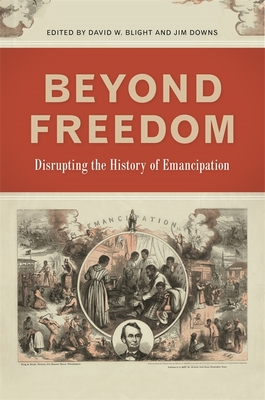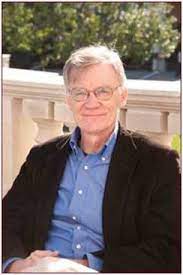

 University of Georgia Press
University of Georgia Press
Beyond Freedom: Disrupting the History of Emancipation


Key Metrics
- David W Blight
- University of Georgia Press
- Hardcover
- 9780820351483
- 9 X 6 X 0.63 inches
- 1.06 pounds
- History > United States - 19th Century
- English
 Secure Transaction
Secure TransactionBook Description
This collection of eleven original essays interrogates the concept of freedom and recenters our understanding of the process of emancipation. Who defined freedom, and what did freedom mean to nineteenth-century African Americans, both during and after slavery? Did freedom just mean the absence of constraint and a widening of personal choice, or did it extend to the ballot box, to education, to equality of opportunity? In examining such questions, rather than defining every aspect of postemancipation life as a new form of freedom, these essays develop the work of scholars who are looking at how belonging to an empowered government or community defines the outcome of emancipation.
Some essays in this collection disrupt the traditional story and time-frame of emancipation. Others offer trenchant renderings of emancipation, with new interpretations of the language and politics of democracy. Still others sidestep academic conventions to speak personally about the politics of emancipation historiography, reconsidering how historians have used source material for understanding subjects such as violence and the suffering of refugee women and children. Together the essays show that the question of freedom--its contested meanings, its social relations, and its beneficiaries--remains central to understanding the complex historical process known as emancipation.
Contributors: Justin Behrend, Gregory P. Downs, Jim Downs, Carole Emberton, Eric Foner, Thavolia Glymph, Chandra Manning, Kate Masur, Richard Newman, James Oakes, Susan O'Donovan, Hannah Rosen, Brenda E. Stevenson.
Author Bio
David W. Blight is Sterling Professor of American History at Yale University, joining that faculty in January, 2003. He previously taught at Amherst College for thirteen years. As of June, 2004, he is Director, succeeding David Brion Davis, of the Gilder Lehrman Center for the Study of Slavery, Resistance, and Abolition at Yale. In 2013-14 he was the William Pitt Professor of American History at Cambridge University, UK, and in 2010-11, Blight was the Rogers Distinguished Fellow in 19th century American History at the Huntington Library, San Marino, CA. During the 2006-07 academic year he was a fellow at the Dorothy and Lewis B. Cullman Center for Writers and Scholars, New York Public Library.
He is currently writing a new, full biography of Frederick Douglass that will be published by Simon and Schuster in 2015. Blight works in many capacities in the world of public history, including on boards of museums and historical societies, and as a member of a small team of advisors to the 9/11 Memorial and Museum team of curators. For that institution he wrote the recently published essay, “Will It Rise: September 11 in American Memory.” In 2012, Blight was elected to the American Academy of Arts and Sciences and delivered an induction address, “The Pleasure and Pain of History.”
Blight’s newest books include annotated editions, with introductory essay, of Frederick Douglass’s second autobiography, My Bondage and My Freedom (Yale Univ. Press, 2013), Robert Penn Warren’s Who Speaks for the Negro, (Yale Univ. Press, 2014), and the monograph, American Oracle: The Civil War in the Civil Rights Era (Harvard University Press, published August 2011), which received the 2012 Anisfield-Wolf Award for best book in non-fiction on racism and human diversity. American Oracle is an intellectual history of Civil War memory, rooted in the work of Robert Penn Warren, Bruce Catton, Edmund Wilson, and James Baldwin.
Blight is also the author of A Slave No More: Two Men Who Escaped to Freedom, Including their Narratives of Emancipation, (Harcourt, 2007), paperback in 2009. This book combines two newly discovered slave narratives in a volume that recovers the lives of their authors, John Washington and Wallace Turnage, as well as provides an incisive history of the story of emancipation. In June, 2004, the New York Times ran a front page story about the discovery and significance of these two rare slave narratives. A Slave No More garnered three book prizes, including the Connecticut Book Award for non-fiction. Blight recently published the articles, “The Theft of Lincoln in History, Politics, and Memory,” in Our Lincoln, Eric Foner, ed., (2008); and “Hating and Loving the ‘Real’ Abe Lincolns: Lincoln and the American South,” in Richard Carwardine and Jay Sexton, eds., The Global Lincoln, (Oxford Univ. Press, 2011); “Mirror of Memory,” American Interest, August, 2011; and numerous op-ed columns for newspapers, including the New York Times and the New York Daily News.
Blight is also the author of Race and Reunion: The Civil War in American Memory (Harvard University Press, 2001), which received eight book awards, including the Bancroft Prize, the Abraham Lincoln Prize, and the Frederick Douglass Prize as well as four awards from the Organization of American Historians, including the Merle Curti prizes for both intellectual and social history.
Other published works include a book of essays, Beyond the Battlefield: Race, Memory, and the American Civil War (University of Massachusetts Press, 2002); and Frederick Douglass’s Civil War: Keeping Faith in Jubilee (LSU Press, 1989). Blight is the editor of and author of introductions for six other books, including When This Cruel War Is Over: The Civil War Letters of Charles Harvey Brewster (Univ. of Massachusetts Press, 1992); Narrative of the Life of Frederick Douglass, An American Slave (Bedford Books, 1993); co-editor with Robert Gooding-Williams, W.E.B. Du Bois, The Souls of Black Folk (Bedford Books, 1997); co-editor with Brooks Simpson, Union and Emancipation: Essays on Politics and Race in the Civil War Era (Kent State Univ. Press, 1997); and Caleb Bingham, The Columbian Orator (orig. 1797, NYU Press, 1997), the book of oratory and antislavery writings that Frederick Douglass discovered while a youth.
The edited volume, Passages to Freedom: The Underground Railroad in History and Memory, was published by Smithsonian Press in 2004 and is the companion book for the opening of the National Underground Railroad Freedom Center in Cincinnati.
Blight is also a frequent book reviewer for the New York Times, Washington Post Book World, the Chicago Tribune, the Los Angeles Times, the San Francisco Chronicle, the Boston Globe, Slate.com and other newspapers, and has written many articles on abolitionism, American historical memory, and African American intellectual and cultural history.
He is one of the authors of the bestselling American history textbook for the college level, A People and a Nation (Houghton Mifflin). He is also series advisor and editor for the Bedford Books series in American History and Culture, a popular series of teaching books for the college level. Blight lectures widely in the US and around the world on the Civil War and Reconstruction, race relations, Douglass, Du Bois, and problems in public history and American historical memory. He teaches summer institutes for secondary teachers and for park rangers and historians in the National Park Service, devoting a good deal of time to these and many other public history initiatives.
Blight has been a consultant to many documentary films, including, “Death and the Civil War,” (2012), the 1998 PBS series, “Africans in America,” and “The Reconstruction Era” (2004) among others. Blight has a Ph. D. from the University of Wisconsin-Madison, and did his undergraduate degree at Michigan State University. He has also taught at Harvard University, at North Central College in Naperville, Illinois, and for seven years was a public high school teacher in his hometown, Flint, Michigan. He was also senior Fulbright Professor in American Studies at the University of Munich in Germany in 1992-93.
Blight was elected as a member of the Society of American Historians in 2002, and served as that Society’s President in 2013-14. Board of Trustees or Advisory Board memberships include the New York Historical Society, the Benjamin Franklin Papers at Yale, the National Underground Railroad Freedom Center in Cincinnati, the National Civil War Center at Tredegar in Richmond, VA, Executive Board of the Organization of American Historians, and the board for African American Programs at Monticello in Charlottesville, VA.
He also served on the board of advisors to the Abraham Lincoln Bicentennial Commission and is involved in planning numerous conferences and events to commemorate the sesquicentennial of the Civil War. In his capacity as director of the Gilder Lehrman Center at Yale, Blight organizes conferences, working groups, lectures, the administering of the annual Frederick Douglass Book Prize, and many public outreach programs regarding the history of slavery and its abolition. Blight maintains a professional web site at davidwblight.com and his lectures for the course, “The Civil War and Reconstruction Era,” are available on line at the Yale University web site, Opencourses.Yale.edu. In 2009, Blight chaired the jury for non-fiction for the National Book Award.
Source: Yale University
Videos












Community reviews
Write a ReviewNo Community reviews